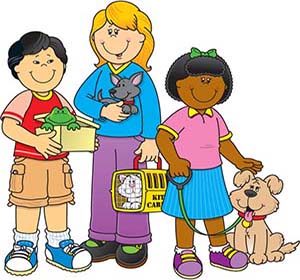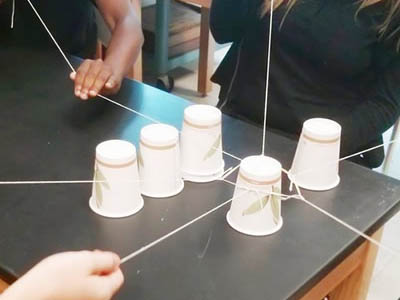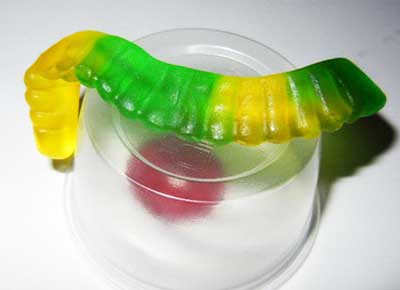
First Day Activities
I've compiled this list of activities over the years as I find new interesting things to do with kids the first day. I often don't do the same one for each class either and may vary the activity based on how much class time we actually have. First days are notorious for interruptions, schedule changes, lost kids, and unpredictable schedules.
This list continues to be updated as I change things year after year or find new activities to try with students. I also do some lab-based activities with older students such as the Mystery Powder Activity, but that does require set-up. All of the activities listed below require minimal materials and advance planning.
1. Notecards
I like to pass out notecards to collect some information about students. I can use these to learn a little about my students and prompt short discussions. For instance, I can pull a card out of the pile and say "John recommends the movie "Transformers". Then I can find John and prompt him to speak by asking "what did you like about it?" or "what was it about?". Specifically talking to the student will also help me remember their names by associating them with some tidbit of information. I prefer my questions to be very nonpersonal to avoid students becoming anxious about the question. Also, if you ask big personal questions like "what is your biggest fear" students will take too long thinking about it, which is not the point of this exercise.
The other thing I do is start off by answering the questions myself, so the class can learn a little about me also.
Name:
Birthday:
Name a movie you would like
to recommend.
Name a book you would like to recommend.
What kind of pets do you have? (What kind of pet would you like to have?):
What person gets too much TV coverage?
What TV show do you always watch?
Name a good place to eat.
2. Introductions Graphic
Students fill out this graphic with information about their favorite movies, books, sports and other personal data. This is meant to be a solitary inventory, though it can be fun to collate the data and come up with Top 10 lists.
3. The Name Game
This one will take a little longer, but it is a good way to learn students' names. Basically you start with a student and have him give his name and something he likes to eat that starts with the same letter as his name. For example: "Greg like grapes.". The next person has to repeat each of the ones before him, so that it keeps adding up. I'm the last person on the list so I have to name everyone's food in the class. You can also have them name something they -don't- like to eat if they are stuck... ex. "Mary hates mushrooms".
4. True or False
This is another meet-and-greet icebreaker that can be used in small classes. In this activity, students are asked to write down three things about themselves, two of the things must be true and one thing must be false. They read the three statements to the class and the class has to guess which is the false statement. Start this one out by doing the three statements first, try to pick something that will surprise the students. If you have student whiteboards they can use those to share their 3 facts.
Example:
1) I have a snake for a pet. 2) I broke my arm over the summer while skateboarding 3) I was a boy scout.
5. Meet and Greet Scavenger Hunt
Print out a bingo style grid from this page and students try to locate people in the class that fit criteria such as "plays an instrument" or "has a cat".
6. Small Group Project - 21st Century Problems
– discuss in groups problems facing the world today and propose solutions, science starter
7. Small Group Project - Listmania
Students compile information as a group based on predesignated categories. This activity helps classmates to get to know one another and work as a group. You can print out pages with the lists on them, or just have the students write them on notebook paper.
| LISTMANIA - name as many things as you can for each group. | |
|
Types of Cars |
Wild Animals that Live in Your State |
|
Countries of the World |
Disney Characters |
|
Professional Football Teams |
Dog Breeds |
8. Small Group Project - The Tower Project
Students get a stack of notecards and a specified length of masking tape and their task is to create the tallest freestanding tower. You can even give prizes to the winning group. This is an excellent project for learning how well your class will cooperate. You can substitute other items such as spaghetti or toothpicks.
You can also substitute spaghetti (which is cheaper) for the tower challenge.
9. Small Group Project - Marshmallow Challenge
This requires a little bit of set-up beforehand. Each group of 3-5 gets 20 sticks of spaghetti, 1 meter of masking tape and a single marshmallow. The goal is for the group to build the tallest free-standing structure that they can in 15 minutes (you can adjust the time.)

10. Small Group Project - Cup Stacking Challenge
Prior to the activity, cut 6 pieces of string and attach them to a single rubberband that is large enough to fit around a plastic cup. (The design should like like a sun with 6 rays of string, string being about 2-3 feet long). Challenge each group of six to stack 10 cups into a pyramid, 4 on the bottom, 3 on the next row, then 2, and then 1 on top. They can only use the string rubber band to stack the cups.

11. Saving Sam
This popular activity asks students to to design a way to save a gummy worm (Sam) from drowning. This one is completed in groups of two and requires cooperation and imagination to figure out a way to get a lifejacket (gummy life saver) around Sam (the gummy worm) using only paperclips.

12. Find Your Match
Place words on notecards or post-its and leave them on the desks for students to walk in (or stick them to a handout). The words have a match and students will stand up, find their "match" and that will be their lab partner and seating assignment. (This works great if you have lab tables instead of desks)
Word Examples
baby --- stroller | toilet --- seat | cell --- phone | tooth ---brush |
pocket --- watch | hand --- lotion | tennis --- shoe | space --- ship |
tv --- guide | egg --- mcmuffin | eye --- shadow | frozen --- yogurt |
Include groups of 3 if you have an odd number in your class, but warn students there will be a group with 3 matches.
| dog --- collar --- hot |
| fruit --- cake --- carrot |
You may have students that don't group up as expected, but that's okay, go around the room and have them share their matches and their justification for going that way. You also may want to put their names on the cards to begin with, older students will sometimes "cheat" so they can sit with their friends.
13. Group Quiz
Similar to listmania, though the questions are more specific and science related, students work as a group to see if who can come up with the correct answers. Can be graded in class and the winning team can receive a prize. You can either print a page, or ask the questions orally.
1. What is the longest bone in the body?
2. What is botany?
3. How long does it take for the earth to make a complete orbit around the sun?
4. How many legs does a spider have? How many legs does an insect have?
5. What scientist is associated with the equation E = mc2?
6. What is the scientific name for a human?
7. Where does a panda bear live?
8. What is the molecular formula for water?
9. What are the colors of the rainbow?
10. Name all of the planets in the solar system, starting with the one closest
to the sun.
*Tiebreaker question: What is the current population of the world (or the U.S), be specific. Closest guess wins the tie. (use a popclock to find the answer to this one).
Quiz answers:
1. femur | 2. study of plants |3. 365 days | 4. 8, 6 | 5. Einstein | 6. Homo
sapiens | 7. china | 8. H20 |
9. red, green, yellow, green, blue, indigo, violet | 10. Mercury, Venus, Earth,
Mars, Jupiter, Saturn, Uranus, Neptune, Pluto*
14. Fortune Telling Fish (Science processes)
If you want to jump right into science, you can do a mini-inquiry lab where students explore a toy called the "Fortune Telling Fish." Students observe what happens when you hold the fish in your hand and it curls. The propose and test reasons why the fish curls (water, heat, etc).
14. Anatomy First Day - Who Knew
Students work in groups to answer a series of questions about themselves (favorite movie, why they are taking the class..etc). Intended for students to get to know each other and for me to get to know them. The google slides include points where students can reply via twitter. Slides can be modified, just download a copy to your own drive to add your own questions.
